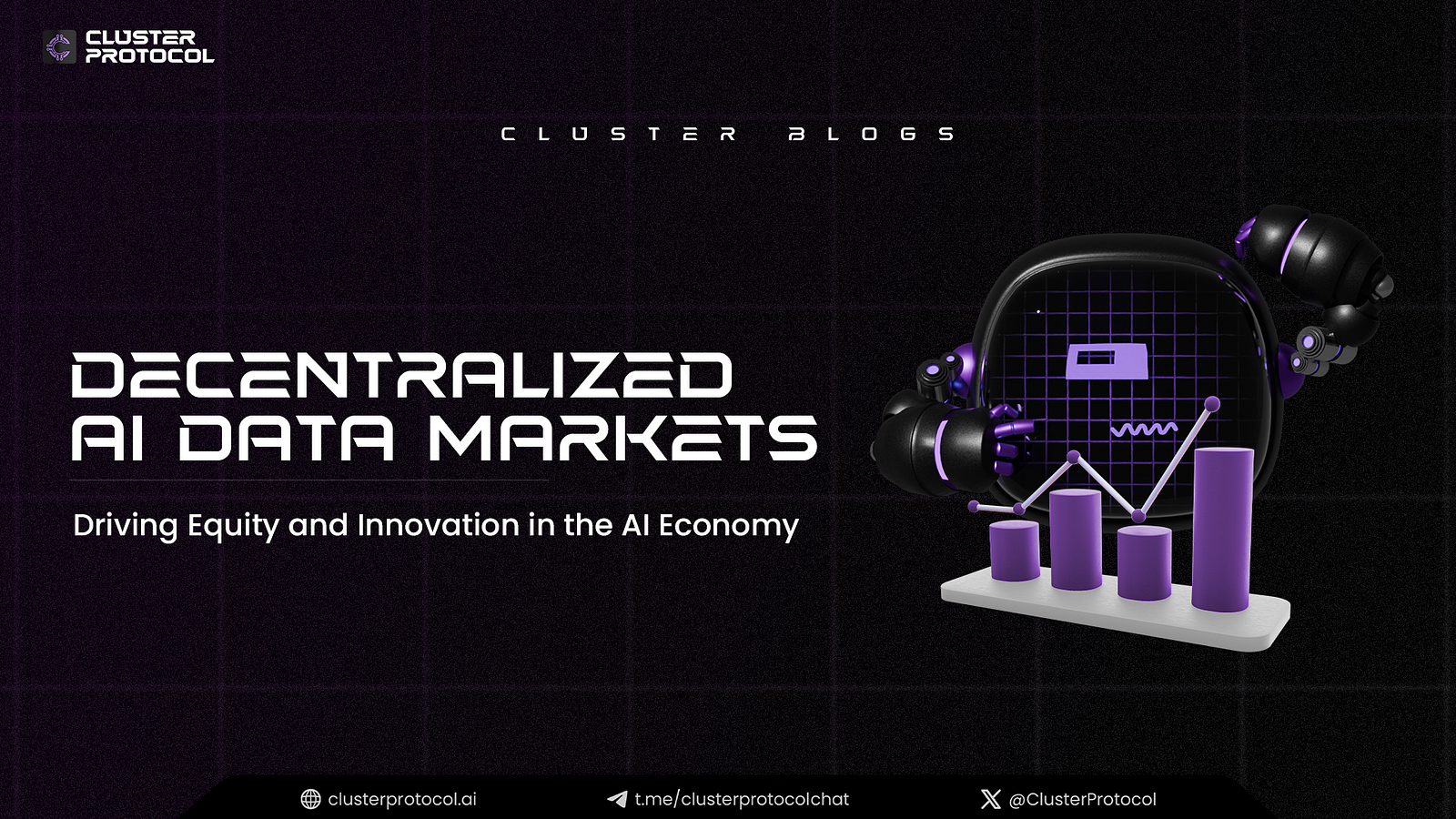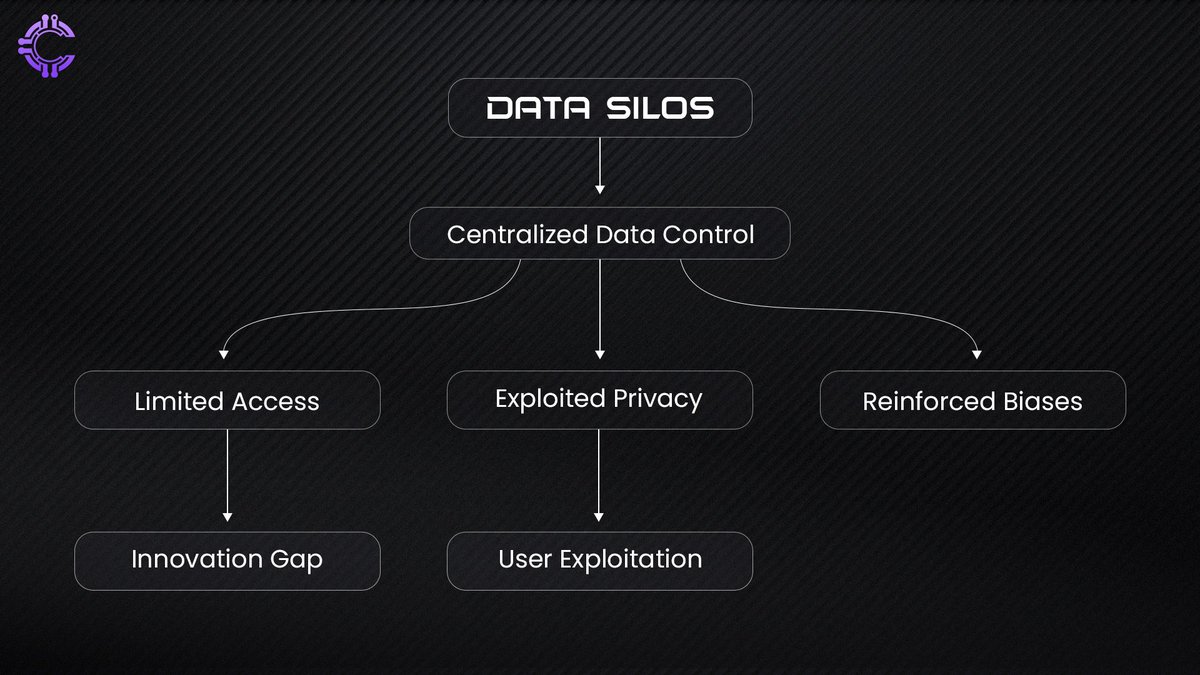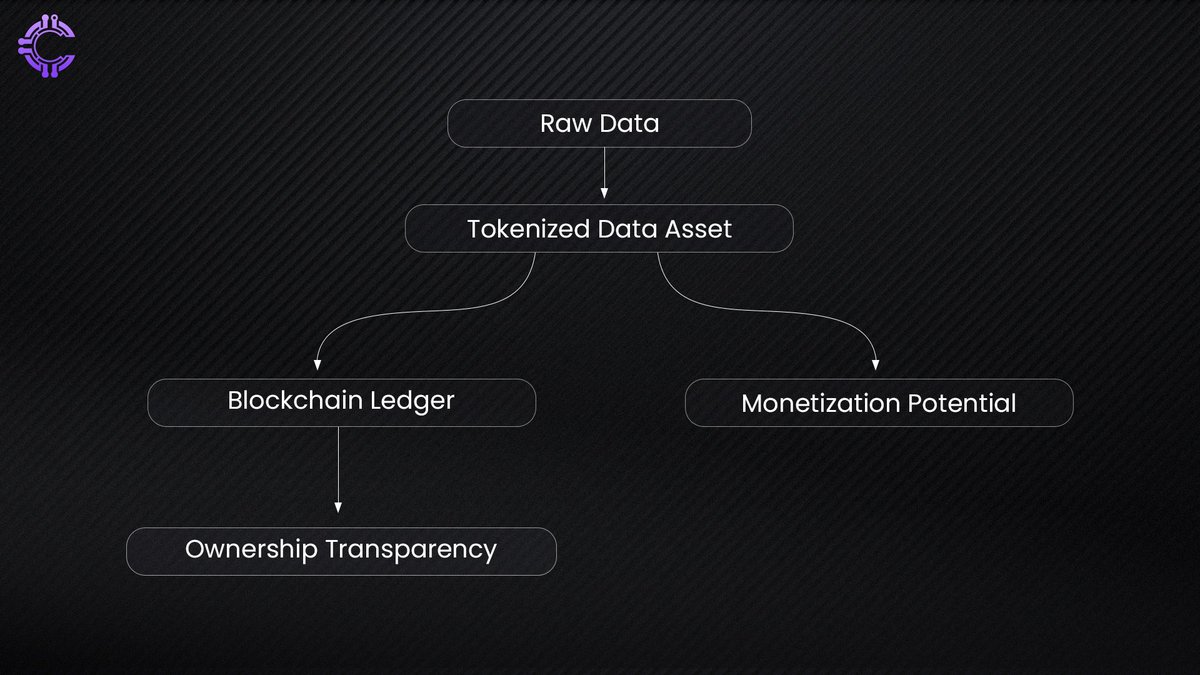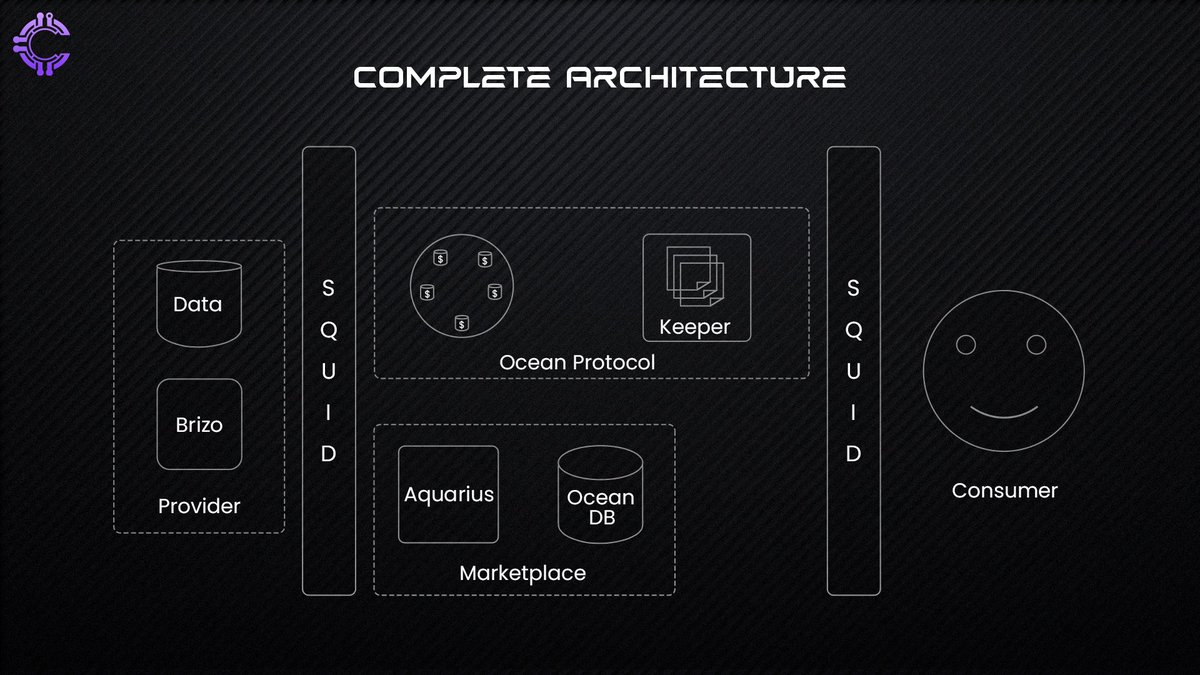The Evolution of Data Markets in Decentralized AI: A Path Toward Equity and Innovation
Jan 31, 2025
9 min Read

In a world increasingly powered by artificial intelligence, data is the fuel driving innovation. Yet, this fuel has been tightly controlled by a handful of major players, creating centralized gatekeepers that dictate who can access it, and at what cost. The rise of decentralized data markets, however, is reshaping this narrative, redistributing power and unlocking immense potential for innovation.
Imagine if Skynet, the infamous AI from Terminator, weren’t a single, monolithic system. Instead of coordinating world domination, it would be made up of thousands of squabbling AIs, arguing over dinner plans. That’s what decentralized data markets bring to the table - no overlords, just countless participants pushing boundaries in a fragmented yet fascinating ecosystem. Here, data isn’t monopolized. It’s exchanged openly, transparently, and directly between owners and innovators.
These markets operate as digital bazaars, where data creators, companies, individuals, sensors - meet developers hungry for the fuel to train their models. Smart contracts and cryptographic systems replace middlemen, ensuring trust without central authority. The result is a paradigm shift where data is fairly compensated, barriers are torn down, and innovation explodes across disciplines.
Far from the polished efficiency of centralized data monopolies, decentralized data markets are chaotic and collaborative. It’s a landscape where data ceases to be a treasure locked away and instead becomes a resource that can fuel AI-driven advancements for all participants, big or small.
Data: The Lifeblood of AI
At the core of every AI system lies an undeniable truth: its effectiveness is entirely dependent on the data it ingests. AI systems—no matter how advanced, are essentially high-powered engines, and data is the fuel that keeps them running. But as with any engine, the quality of the fuel determines the performance. “Garbage in, garbage out” might sound simplistic, but it encapsulates the challenge AI faces. Poor-quality data doesn’t just lead to weak outputs; it can sabotage entire systems, undermining their ability to learn, adapt, and perform.

Data as AI’s Foundation
While AI amplifies the insights and potential of data, it’s important to recognize that data has been valuable long before AI came onto the scene. Consider it the foundation of modern decision-making. Historical data-driven insights in healthcare, economics, and engineering have been critical for centuries, even without the sophistication of algorithms to interpret them. But today, data’s role has grown exponentially, as AI thrives on its diversity and scale. More data doesn’t just improve AI—it enables the exploration of more nuanced patterns and predictions that would have been impossible with limited or siloed datasets.
Data Contamination: AI’s Vulnerability
One of AI’s greatest vulnerabilities is data contamination, or adversarial poisoning. Contaminated datasets can train AI models to misinterpret information and make errors at scale. In extreme cases, this can derail the system’s entire ability to generate accurate predictions or adapt effectively.

This interdependence highlights the crucial role of robust data pipelines and rigorous validation processes. AI can only achieve its transformative potential when the data underpinning it is high-quality, secure, and reliable. Without that, the entire system risks being compromised.
Data Silos and Centralized Power
As AI reshapes industries, it does so on the back of data. But the question looms: who controls this precious resource? Today, a handful of corporate giants like Google hold the keys to the data vault. These centralized systems are efficient for profits but come with significant drawbacks that affect innovation, privacy, and fairness.
The Monopoly Problem
“Centralization creates efficiency for the few but stagnation for the many.” Google and other tech giants amass vast amounts of data through services like Gmail and Maps, converting it into user profiles they monetize for targeted advertising. Smaller businesses and independent developers find themselves locked out, unable to compete in this data-centric world.
By 2025, the global data market is expected to surpass $275 billion, yet 80% of that value is controlled by less than 10% of companies.
Privacy Takes a Hit
With centralization, privacy becomes an afterthought. Data is aggregated, processed, and sold—often without users’ clear consent. As AI advances, predictive algorithms depend more heavily on these personal datasets, making privacy a significant casualty of progress.
The Core Problems with Centralized Data Silos:
Limited Access: Smaller players face challenges in acquiring diverse, high-quality datasets, stifling innovation.
Privacy Violations: User data is exploited for profit, often without consent or transparency.
Bias Reinforcement: Centralized datasets reflect inherent biases, which AI models perpetuate.
Economic Inequality: Large corporations retain AI’s competitive advantage, while small businesses remain on the sidelines.
Visualizing Data Silos

The Dark World of Data Brokers: Silent Profiteers of Your Secrets
Picture a hidden marketplace where your most personal details - browsing habits, credit history, even your shopping preferences - are traded like hot commodities. This is the reality of data brokers, shadowy middlemen who quietly collect and sell your digital footprint to advertisers, corporations, and sometimes even other brokers. The alarming part? Most of us have no idea this is happening.
This unchecked trade of personal data brings with it an ever-present threat: privacy breaches. Think of a privacy breach as someone rummaging through your personal diary - but instead of one journal, it’s your entire digital existence. From stolen passwords to sensitive emails, a breach exposes your most private information to unauthorized individuals or organizations, often with devastating consequences.
Take the infamous Equifax breach of 2017, where hackers exploited a simple security flaw to expose sensitive data - like Social Security numbers and birth dates - of 147 million people. It was a digital heist of epic proportions, and the worst part? Victims weren’t informed immediately, leaving their data vulnerable to exploitation.
This fragile, centralized system benefits data giants while putting everyone else at risk. = It’s a power imbalance =
• Monopoly on data: A handful of companies hoard resources critical for AI development.
• Stifled innovation: Smaller players are locked out of the data economy.
• Unequal power: A few control access, leaving the rest to navigate an unfair playing field.
As the gatekeepers of data tighten their grip, innovation, privacy, and fairness remain the casualties. It’s a system screaming for decentralization.
The Dom-Sub Relationship: Big Tech’s Stranglehold on Data

In today’s AI-driven world, control over data defines power—and a few tech giants dominate the landscape. Companies like Google and Facebook hold 90% of the world’s online data, creating a system where innovation is stifled. These monopolies hoard critical resources, leaving smaller businesses scrambling for scraps.
This imbalance is akin to a digital feudal system: the powerful elite dictate who gets access, while the rest are left struggling to compete. For smaller players, the cost of accessing high-quality, diverse datasets is prohibitive, pushing them to the sidelines and reinforcing economic inequality.
The result? A future shaped by the few, not the many.
Decentralized Data Marketplaces: Breaking Free from Data Monopolies
The age of centralized data control is waning, and its limitations - restricted access, lack of transparency, and innovation bottlenecks - are glaring. Enter decentralized data marketplaces: a revolutionary model that shifts power away from corporate monopolies, empowering individuals and organizations alike.
These marketplaces function like vibrant digital bazaars, where data isn’t hoarded but openly exchanged. Owners and innovators connect directly, creating a transparent, equitable ecosystem. By leveraging blockchain and smart contracts, decentralized markets enable trust and fairness without middlemen.
Picture moving from an exclusive, corporate-controlled boardroom to an inclusive marketplace where everyone can contribute, collaborate, and thrive.
It’s data - democratized.
Blockchain and Tokenization: Powering Decentralization
At the heart of decentralized data markets lies blockchain technology, providing transparency, security, and automation. Here’s how key components enable a new era of data sharing:
Data Tokenization: Data sets are represented as tradable tokens on blockchain networks, allowing clear ownership and monetization. As one researcher put it, “Tokenized data doesn’t just belong to organizations—it belongs to everyone with a stake in its creation.”
Privacy Through Compute-to-Data: Unlike centralized systems where raw data is shared, techniques like Compute-to-Data allow insights to be shared without exposing raw datasets.
Trust Without Middlemen: Smart contracts automate transactions, creating trust in an environment that eliminates reliance on intermediaries.

Benefits of Decentralized Markets
Accessibility: Breaks down barriers to data, allowing businesses and innovators globally to tap into diverse datasets.
Monetization: Empowers individuals and organizations to turn data into an asset, creating new revenue streams.
Innovation: Enables access to high-quality, ethically sourced data for advanced AI development and analytics.
Instead of relying on a small group of corporations to call the shots, decentralized data markets allow for more diverse voices, creativity, and innovation. It’s a more democratic approach where data isn’t hoarded—it’s shared and exchanged freely, ensuring more security, fairness, and inclusivity. Essentially, it’s like moving from a top-down, closed-off system to a more open and collaborative space, where everyone has the opportunity to shape the future of AI.
Ocean Protocol: Transforming Data into a Liquid Asset
Ocean Protocol revolutionizes data exchange by turning datasets into tokenized assets, leveraging ERC721 data NFTs and ERC20 datatokens. Its Compute-to-Data framework is a privacy-preserving powerhouse, allowing private datasets to fuel AI innovation without exposing raw data. This eliminates trust barriers, enabling secure collaboration across industries.
On Ocean Market, publishing data isn’t just sharing - it’s launching an Initial Data Offering (IDO). Each dataset becomes a tradable asset, with creators setting free or fixed prices, unlocking liquidity in previously siloed datasets.

Sahara AI: The Airbnb of Data Sharing
Sahara AI simplifies data monetization by putting creators in control, much like Airbnb transformed room rentals. With blockchain-powered transparency and robust privacy features, Sahara AI ensures trust and fairness in every transaction.
Data and AI model owners can confidently monetize their assets, knowing they’ll receive fair compensation while retaining ownership. By blending security with simplicity, Sahara AI creates an accessible, trusted space for collaboration.
A New Dawn for Data
The rise of decentralized data markets signals a transformative shift in the way data is controlled, accessed, and utilized. As the centralization of data gives way to a more open and equitable ecosystem, the potential for innovation is limitless. By enabling a more inclusive approach, decentralized markets are dismantling the monopolistic stronghold of tech giants and empowering individuals and smaller businesses to participate in AI development. This isn’t just a technological revolution - it’s a societal one, where power is distributed, privacy is respected, and creativity flourishes without boundaries.
Decentralized data markets also challenge us to rethink how we value and exchange information. Data isn’t just a byproduct of our digital interactions; it’s a powerful resource that, when shared ethically and transparently, can drive unprecedented progress across industries. In this emerging era, data is no longer a commodity controlled by the few - it’s a shared asset, fueling a future where AI belongs to everyone.
As the foundations of AI continue to evolve, one thing is clear: the road ahead is not about centralized empires but decentralized collaborations. The decentralized data revolution has just begun, and it promises a more balanced and innovative future for us all.
About Cluster Protocol
Cluster Protocol is the co-ordination layer for AI agents, a carnot engine fueling the AI economy making sure the AI developers are monetized for their AI models and users get an unified seamless experience to build that next AI app/ agent within a virtual disposable environment facilitating the creation of modular, self-evolving AI agents.
Cluster Protocol also supports decentralized datasets and collaborative model training environments, which reduce the barriers to AI development and democratize access to computational resources. We believe in the power of templatization to streamline AI development.
Cluster Protocol offers a wide range of pre-built AI templates, allowing users to quickly create and customize AI solutions for their specific needs. Our intuitive infrastructure empowers users to create AI-powered applications without requiring deep technical expertise.
Cluster Protocol provides the necessary infrastructure for creating intelligent agentic workflows that can autonomously perform actions based on predefined rules and real-time data. Additionally, individuals can leverage our platform to automate their daily tasks, saving time and effort.
🌐 Cluster Protocol’s Official Links:
